
Rabbi Amar
צילום: יצחק אלהרר
H1N1 recommendation: Don't kiss mezuzot
Ultra-Orthodox media concerned with spreading of swine flu epidemic asks the question: Can disease be contracted by kissing mezuzah? Seven doctors asked say all objects may be infectious, one doctor specifically recommends practice be avoided
Wednesday morning, Assaf Harofeh Medical Center announced it would limit visits to maternity wards for fear of having patients and newborn babies infected with swine flu, and now, one of the hospital's doctors has also recommended people refrain from kissing mezuzot in public places.
A mezuzah is piece of parchment inscribed with a Jewish prayer affixed on doorframes of Jewish homes as a mitzvah.
Israel's Sephardic Chief Rabbi Shlomo Amar also addressed the issue, saying, "If a specific order is given in the matter, the mezuzah must be kissed from the air, to ensure that the custom is not forgotten."
The H1N1 epidemic is a cause of major concern worldwide, and ultra-Orthodox media has not overlooked it. Haredi reporter Ozel Vatik interviewed seven doctors - including Emergency Room directors and specialists on infectious diseases – on the risks of contracting the virus from kissing a mezuzah – a custom that is highly common among religious and traditional Jews.
The doctors unanimously agreed that bacteria leave high levels of residue on such objects, but six of them refused to comment on mezuzot in particular, "so as not to get in trouble with the rabbis".
Dr. Ilan Youngster, a pediatrician at Assaf Harofeh Medical Center, was the only doctor to link risks of infection with kissing the mezuzah, and he even took it one step further and recommended people refrain from doing so.
He based his recommendation on a study he presented about a year-and-a-half ago, in which 70 mezuzot from Assaf Harofeh were sampled and sent in for lab tests. The results were published on Ynet, and showed that all the mezuzot contained dangerous bacteria.
Youngster said then that the results of mezuzot in private homes were expected to be similar and explained, "Most of the bacterial colonies that were found were of bacteria that are found on the skin. Perhaps because of the fact that the mezuzah is a religious object, people are afraid to sterilize it."
Most of the mezuzot tested in the study included colonies of Staphylococcus Coagulase Negative, that can cause serious infectious diseases. The study also revealed E. coli bacteria that cause infections in the reproductive system and urinary tract, Klebsiella, which can cause various infections including pneumonia, and more.
Chief Rabbi Shlomo Amar was asked for his opinion on Dr. Youngster's recommendation and said he was not thrilled with the idea, at least as long as it is not adopted by the Health Ministry. The rabbi said, "If an official order is issued – I recommend anyone that wants to follow it put his hand near the mezuzah and kiss it, so as not to miss out on this good and important custom."










